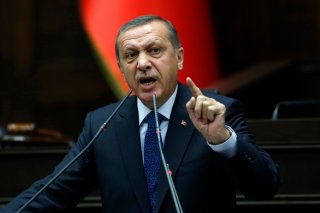What a Quran Burning Reveals About Turkey’s Alliance With the West
There is a growing gap between Islamic and Western notions of what constitutes sacred religious rights and freedom of expression.
There is a Turkish proverb: When an idiot throws a stone into a well, forty wise men can’t pull it out. Well, that’s what an anti-Muslim activist succeeded in doing last Saturday when he burned a Quran outside the Turkish embassy in Stockholm.
According to the perpetrator, Rasmus Paludan, the leader of a fringe Danish party, Stram Kurs (“Hard Line”), he was put up to the idea by a consultant for the right-wing Sverigedemokraterna (Sweden Democrats), who paid $30 for his demonstration permit. The Sweden Democrats provide parliamentary support for the Swedish government, but their view of Sweden’s NATO membership is ambivalent. Whatever the motive for the provocation, it has thrown a spanner in the works.
Adding insult to injury, ten days earlier a pro-Kurdish group hanged an effigy of Turkish president Recep Tayyip Erdogan upside down from a lamppost outside Stockholm’s City Hall.
At the best of times, the Turkish president has a short fuse but burning the Quran played into his hands. With popular support, he roundly condemned the provocation and declared Sweden could no longer expect Turkey’s support for its application for NATO membership. A visit by Sweden’s minister of defense has been canceled, and Turkey has postponed NATO accession talks with Sweden and Finland.
Protests have also spread to the Middle East, Pakistan, and Indonesia, which has the world’s largest Muslim population. However, Paludan’s provocation is not the first time this has taken place in Scandinavia.
In 2005 the Danish daily Jyllands-Posten published twelve cartoons of the Prophet Muhammad in protest against the fact that a Danish writer couldn’t find an illustrator for a children’s book about the Prophet. Eleven Muslim ambassadors called on the Danish prime minister Anders Fogh Rasmussen “to take all those responsible to task under law of the land.” Rasmussen replied that “The freedom of expression has a wide scope and the Danish government has no means of influencing the press.”
There were widespread demonstrations, some of them violent, in a number of Muslim countries and a boycott of Danish goods. Turkey, as it already intends to do in the present situation, made political capital out of the situation, and strongly opposed Rasmussen’s appointment as NATO’s new secretary-general.
America also has its Bible burners, but their activities are met with a shrug. However, there is no doubt Paludan’s demonstration is gratuitously offensive and has met with international condemnation.
In Erika López Prater v. Trustees of the Hamline University of Minnesota America faces a conflict similar to that of the cartoon crisis in Denmark. Erika López Prater, an adjunct professor at Hamline University, showed a fourteenth-century painting of the Prophet Muhammad in a lesson on Islamic art, and was fired because the university considered her conduct “undeniably Islamophobic.”
Hamline has admitted its action was “a misstep” but López Prater has opened a lawsuit claiming religious discrimination and defamation.
On the whole, there seems to be confusion as to what constitutes Islamophobia and criticism of political Islam. The Turkish constitution states in its preamble that sacred religious feelings shall absolutely not be involved in state affairs and politics as required by the principle of secularism.
Further, in Article 24, “no one shall be allowed to exploit or abuse religion or religious feelings, or things held sacred by religion, in any manner whatsoever, for the purpose of personal or political interest or influence, or for even partially basing the fundamental, social, economic, political, and legal order of the State on religious tenets.”
Yet, as I have pointed out here, Erdogan has imposed his Islamist mindset not only on Turkey’s domestic policy (including the economy) but also foreign policy.
With regard to freedom of expression, there is also a conflict of interest between the Islamic and Western views. The Islamic definition, as defined by the Cairo Declaration of Human Rights in Islam (1990), limits the expression of opinion to a manner that would not be contrary to Sharia—Islamic law based on the Quran—which is incompatible with the UN Declaration of Human Rights and the International Covenant on Civil and Political Rights.
But Turkey is a signatory to both the Cairo Declaration and the International Covenant. Furthermore, as a member of the Council of Europe, it is also a signatory to the European Convention on Human Rights.
Erdogan’s chief advisor and spokesperson, Ibrahim Kalin, in his keynote speech at the Istanbul Forum in 2012, mentioned the growing gap between Islamic and Western notions of what constitutes sacred religious rights and freedom of expression.
In Wednesday’s meeting of the Turkish National Security Council, it was underlined that states wishing to join NATO should also act in accordance with the law and spirit of the alliance.
It would be timely to point out that NATO in its preamble states that the organization is founded on the principles of democracy, individual liberty, and the rule of law.
Robert Ellis is an international advisor at the Research Institute for European and American Studies in Athens.
Image: Mustafa Kirazli / Shutterstock.com

